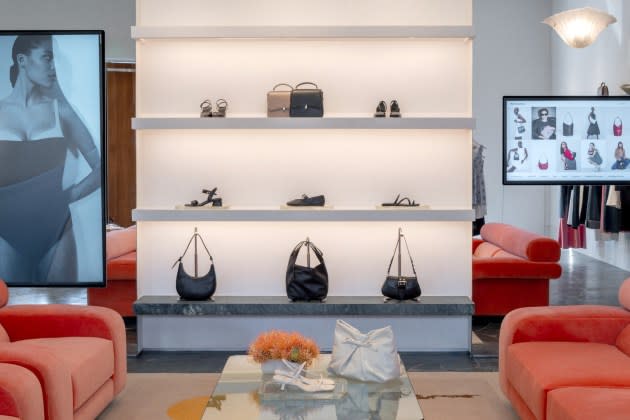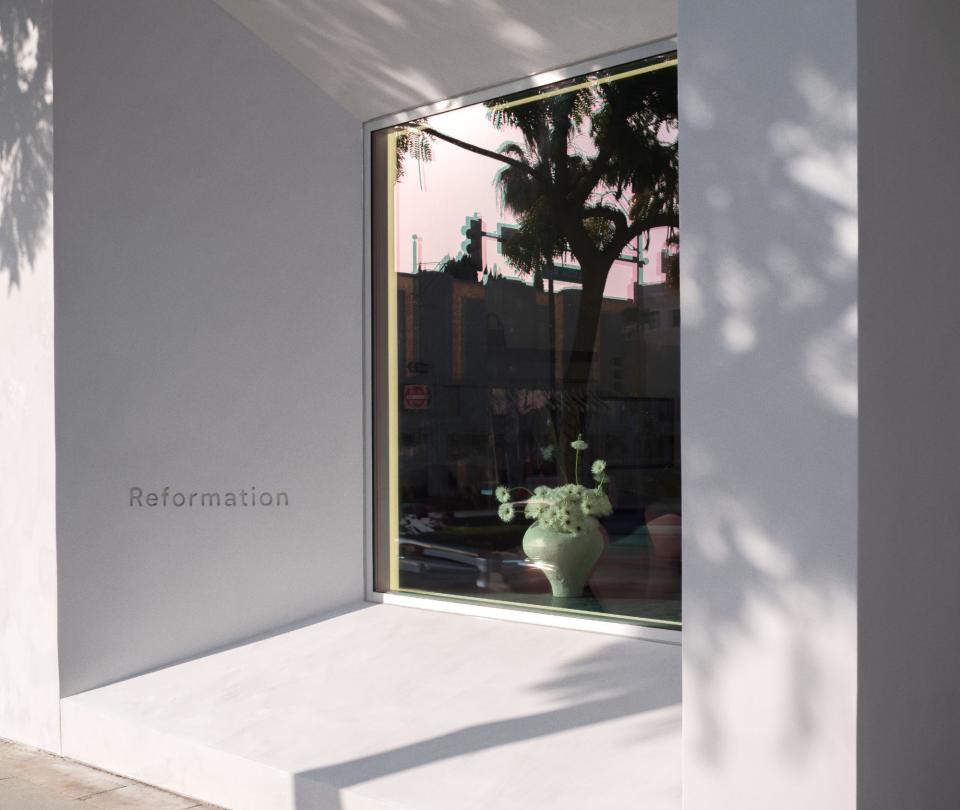Reformation’s Beverly Hills Flagship Is Full of Restored Vintage Furniture

Beverly Hills just got a touch of sustainability on one of its major shopping streets.
Reformation, the eco-friendly women’s clothing brand born in Los Angeles 15 years ago, took the wraps off its newest location — a flagship at 409 North Beverly Drive, one block away from Rodeo Drive.
More from WWD
British Brand Represent Celebrates L.A. Store Opening, Its First Flagship
Enter Thom Sweeney, Los Angeles' Resident English Tailor to the Stars and Millionaires
The new venue has 13 dressing rooms, which are part of the 3,400-square-foot space once occupied by a Planet Blue location, a casual womenswear chain that closed all its stores in 2020.
“Beverly Hills is such an iconic neighborhood, and it felt like a natural fit for our largest offering,” said Hali Borenstein, the company’s chief executive officer. “We already have five other stores in Los Angeles, but the middle of the city was not covered. And Beverly Hills is such a tourist destination.”
This is Reformation’s second flagship incorporating its new retail interior design scheme with warmer wood tones that are part of contemporary and vintage looks. Reformation’s new flagship in New York’s SoHo district was first to unveil the new look last June.
All the furnishings in the Beverly Hills outpost are restored vintage pieces and the wall lights are vintage Italian. The most distinctive feature is an oculus in the center of the ceiling that lets in natural light. The green marble floors are sourced from Italy.
Reformation worked with local artists to decorate the space. Artist Ash Roberts created paintings for the store. Furniture designer Brett Robinson created new cold-rolled steel handbag stands, and glass artist Scott Slagerman made glass trays and door handles seen throughout the space.

The store also incorporates the latest in retail technology with sales associates armed with touchscreens to help customers find items, and touchscreens also are on the walls for shoppers to use for stocking their dressing rooms.
The Beverly Hills location is part of the company’s rapid retail rollout that has been taking place over the last few years. And it will continue. “We are expanding to 10 or 15 locations annually,” said Borenstein, who joined the company 10 years ago as the director of merchandising and became the CEO in 2020. “First, we go to cities with a big e-commerce presence, and then we fill out a market where we already have a store. For example, our downtown location in Chicago is doing well, so we opened a suburban location. And then we open stores in new markets where we want to meet new customers who can touch the product.”
Stand-alone retail locations are important to the brand because many of Reformation’s customers are cross-channel shoppers. That means when they come in, they try on styles they have already seen online. “Our customer spends a lot of time in our dressing rooms,” the CEO explained, noting that 65 percent of people who walk into a dressing room end up making a purchase.
That’s why 80 percent of the company’s stores are tech-enabled, to make shopping as seamless as possible where even the dressing room has a touchscreen for selecting different sizes or styles.
Reformation has been undergoing its own reformation ever since Borenstein joined the retailer nearly 10 years ago after getting her master’s degree at Stanford’s Graduate School of Business. “When I started, it was a very small business, and we were just figuring out our foundation and our core principles,” she recalled.
The clothing company began by selling vintage clothing but quickly expanded into the wider category of making garments from sustainable or recycled fibers. In the beginning, Reformation had only three traditional-style stores and e-commerce was in the beginning stages while dresses were the bestselling category. But in 2019, Permira, a British global investment company, bought a majority stake in the company, which aided the major expansion launched in 2017.
Today, the Los Angeles company has annual revenues of more than $350 million with just 3 percent to 5 percent of sales coming from vintage clothing sales, Borenstein said. Reformation operates 44 stores around the world, with 12 of those in California. It has its own factory in downtown Los Angeles that employs about 200 workers who make a lot of the label’s samples and fill replenishment orders.
“It is really a different company,” the Reformation CEO said. “Now we have a wide assortment of clothing. It’s not just dresses. Our fastest growing category is denim, shoes and tops. And we just launched swimwear a few weeks ago.”
.
Best of WWD

